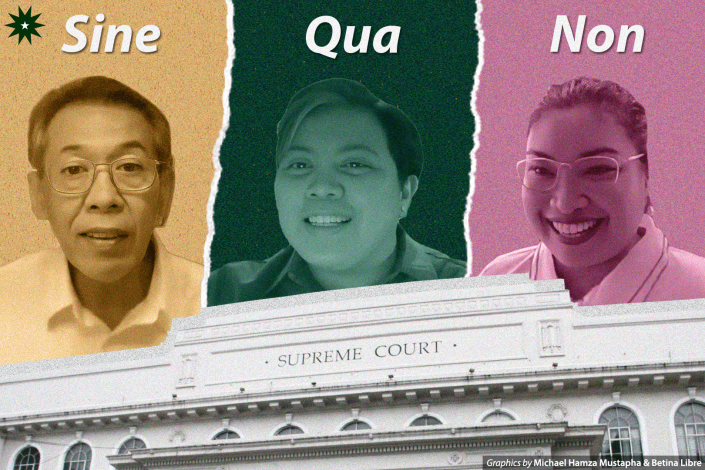Sine Qua Non: The Importance of Judiciary in the Philippine Legal System was held last June 4, spearheaded by the DLSU University Student Government Judiciary. The event featured former DLSU College of Law Dean Atty. Chel Diokno, Atty. Charmaine Alovera, and Judge Ma. Christina Lim, whose segments covered legal and judicial knowledge, along with insights on the future of aspiring law students.

Debunking myths
A discussion on some misconceptions about laywers was opened by Alovera. Among these stereotypes, the assumption of lawyers being unnecessary is a myth believed by many. This stems mostly from people avoiding payment for their services or from the belief that lawyers create more complications than remedies. However, there is more than meets the eye in a client’s perspective when seeking a lawyer’s service, Alovera assured.
Misconceptions and impressions of society on lawyers were also discussed in the event, such as lawyers earning more, that they are “ambulance chasers”, and that clients go after them more and not the other way around. Alovera also shared that lawyers have different rates and take into consideration the clients’ financial resources.
“Everyone has a right to a lawyer but lawyers must need to earn a living too through the clients that reach out to them,” Alovera clarified.
Another common myth brought up was that a good lawyer wins every case. But Alovera contested that winning every case does not equate to being a good lawyer. “A good lawyer is a lawyer that lets justice prevail, whether it means winning or losing on their part,” she attested.
Role of law and the justice system
Lim also willingly shared personal experiences as a judge and the differences between working as a private and public attorney. “I would say that…as [having been] a law practitioner in the private sector, as a government lawyer, and now as a judge, they all differ in terms of my learning experience. I have put on various hats, protecting different types of rights and interests,” she said.
A judge, however, cannot engage in the private practice of law as they are required to remain impartial. This is a battle with the obvious reason that they, too, are humans. But it is expected that to dispense justice, authority and respect is essential, as explained by Lim. She furthered that to remain impartial balances the interest and prevails justice, “It is emotionally, mentally, and intellectually a taxing job.”
Aside from personal struggles as lawyers, Diokno also discussed the challenge within the Philippine law system. He stated that the Philippines lacks judges and prosecutors, which results in the slow processing of cases in the country. He cited that one out of five courts does not have a judge, and that the concerning vacancy rate of prosecutors is around 30 percent. “We have a lot to improve as far as our justice system is concerned,” he commented.
With this sentiment, Diokno also stated that calling upon leaders can strengthen the country’s social justice system and called on the youth to engage people and to be the voice for the marginalized.
What makes a lawyer?
Alovera and Lim also provided advice for those looking to work in the legal profession, warning that a lot of reading is to be expected. Most work in the profession does not happen in the court itself but is instead spent on researching and finding ways to make compromises or agreements with other parties.
Lim shared that dedication and passion are both needed for the field. But to truly thrive, Alovera imparted that determination and willingness are also needed, as law school will involve sacrificing a lot of time and effort for one’s future as a lawyer. As such, Alovera also advises that students must always find time for rest as well beyond simply finishing assigned readings.
She affirmed that taking up the profession is not just about the money, prestige, or the thrill of winning the case. It is also in the name of justice and serving others.
Above all, however, both Lim and Alovera encourage aspiring lawyers to not give up in the face of difficulties or fear. The judge also emphasized the importance of self-confidence and not questioning one’s abilities. At the end of the day, the key is to keep going as there will always be reasons to reach the profession if one really wants it.
